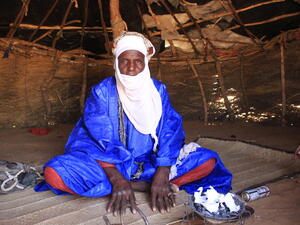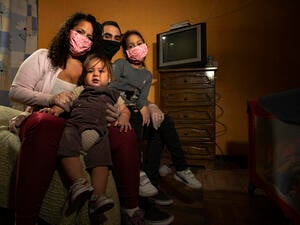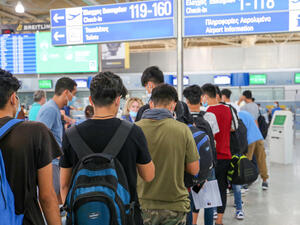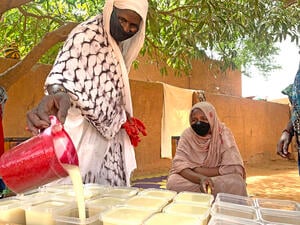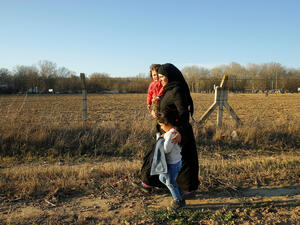UNHCR concerned about growing abuse as more people sail from Bay of Bengal
UNHCR concerned about growing abuse as more people sail from Bay of Bengal
Two years after inter-communal violence erupted in Myanmar's Rakhine state, thousands of people are still leaving by boat from the Bay of Bengal. Reports of abuse and exploitation as people seek safety and stability elsewhere are meanwhile increasing.
UNHCR estimates more than 86,000 people have left on boats since June 2012. This includes more than 16,000 people in the second half of 2012, 55,000 in 2013 and nearly 15,000 from January to April this year. The majority are Rohingya, although anecdotally the proportion of Bangladeshis has grown this year.
While 730 people are reported to have died on this journey in the second half of 2012, that number fell to 615 for all of last year, possibly due to the use of larger, more stable cargo boats by smuggling networks.
People who have made it to Thailand, Malaysia or Indonesia have told UNHCR staff about overcrowded boats that sometimes lost their way or developed engine problems. Some ran out of food and water due to the long periods at sea. Some who died on the boats are said to have been thrown overboard.
Across the region, UNHCR continues to advocate for temporary stay arrangements for the Rohingya until the situation stabilizes sufficiently in Rakhine state for them to return. These arrangements involve acquiring the documented right to remain in the host country for the designated period, protection against arbitrary detention, respect for family unity, guarantees of shelter as well as access to services and lawful work opportunities.
Thailand
Some of those who have reached Thailand speak of being taken to smugglers' camps in the jungles or hills near the Thailand-Malaysia border. There they were kept for months in overcrowded camps and sometimes even cages until their families could pay for their release. While in captivity they were given rice with dried fish once, sometimes twice a day. They recount daily beatings and that some people died. No one was allowed to move except for limited toilet breaks. They spent their days sitting in confined spaces and nights sleeping upright or in foetal position due to the lack of space.
The Thai authorities have conducted several raids on these smugglers' camps, rescuing hundreds of people, including some 500 Rohingya earlier this year. UNHCR is providing relief and advocating for a more clearly defined temporary protection regime during their stay in Thailand that would include, for example, access to education for the children and enhanced freedom of movement. Most immediately, to facilitate recovery and improve conditions of stay from the current immigration detention centres, we have offered to support rehabilitation centres where families can stay together and basic community activities can be organized while longer-term solutions are sought. The most vulnerable cases are submitted for consideration by resettlement countries.
Malaysia
In the northern region of Peninsular Malaysia, there have been increased reports of smuggling and trafficking from Thailand of people from Myanmar, including those who are of concern to UNHCR. Reliable reports indicate these groups frequently face abuse, ill-treatment, exploitation and extortion by smuggling gangs. These raise very significant protection issues for refugees and others of concern to UNHCR.
An increasing number are in poor physical and emotional health - malnourished and unable to walk. Since November, UNHCR staff in Kuala Lumpur have received more than 120 Rohingya identified with Beriberi due to Vitamin B1 deficiency. We are giving them vitamin supplements and housing the most serious cases at a shelter where they receive food, medical care and physiotherapy to help them recover.
UNHCR is advocating for the prompt release from detention of any detained Rohingya and others of concern. We also believe that improved access to health and other support services, including lawful employment opportunities, will allow refugees to be self-reliant and more resilient in the community. In total UNHCR has registered more than 35,000 Rohingya in Malaysia over the years. UNHCR appreciates the collaboration with the authorities in Malaysia to address the needs of these communities.
Indonesia
In Indonesia, the Rohingya now number more than 1,200 people. Registration numbers peaked during the second half of 2013 with 474 new arrivals after several boats arrived from Thailand; others also crossed over from Malaysia. This year the trend of arrivals has dropped significantly to only 56 people up to May. In addition, from January to May 2014, 99 Rohingya, including a small number of secondary movers from Malaysia, are reported to have returned to Malaysia. Those who remain in Indonesia mostly live in community housing, while some 160 are in immigration detention centres. Frustrations and tensions are rising due to the lack of solutions.
Bangladesh
In Bangladesh, which has hosted Rohingya refugees for more than two decades, there have been several positive developments in the last year. Education was extended to middle school level (13-14 year-old children) in the two official camps hosting more than 30,000 Rohingya refugees. We have also enhanced efforts to address gender-based violence in the camps, including by facilitating the deployment of policewomen. In addition, the Government has also agreed to the improvement of services in the camps including shelter and livelihood opportunities. UNHCR welcomes the Bangladeshi government's initiative to "list" an estimated 200,000 to 500,000 unregistered Rohingya in Bangladesh. We hope the exercise will be carried out in accordance with international standards and that it will result in access to documentation, assistance and justice for these groups living outside the camps.
Myanmar
In Rakhine state, some 140,000 people remain displaced - the majority of them Rohingya, with smaller numbers of Rakhine, Kaman and other ethnicities. Aid workers have resumed humanitarian assistance following attacks on UN and NGO premises in Sittwe in late March. While UNHCR remains committed to providing temporary shelters, coordinating camp management and addressing a difficult protection situation, we are wary of activities that could entrench segregation and protracted displacement. The challenge is to move from an emergency phase towards durable solutions.
For more information on this topic, please contact:
-
In Bangkok (Regional Spokesperson), Vivian Tan on mobile +66 818 270 280
-
In Myanmar, Medea Savary on mobile +95 944 802 7892
-
In Malaysia, Yante Ismail on mobile +601 3 352 6286
-
In Bangladesh, Onchita Shadman on mobile +880 171 309 0375
-
In Geneva, Adrian Edwards on mobile +41 79 557 9120
-
In Geneva, Babar Baloch on mobile +41 79 557 9106

